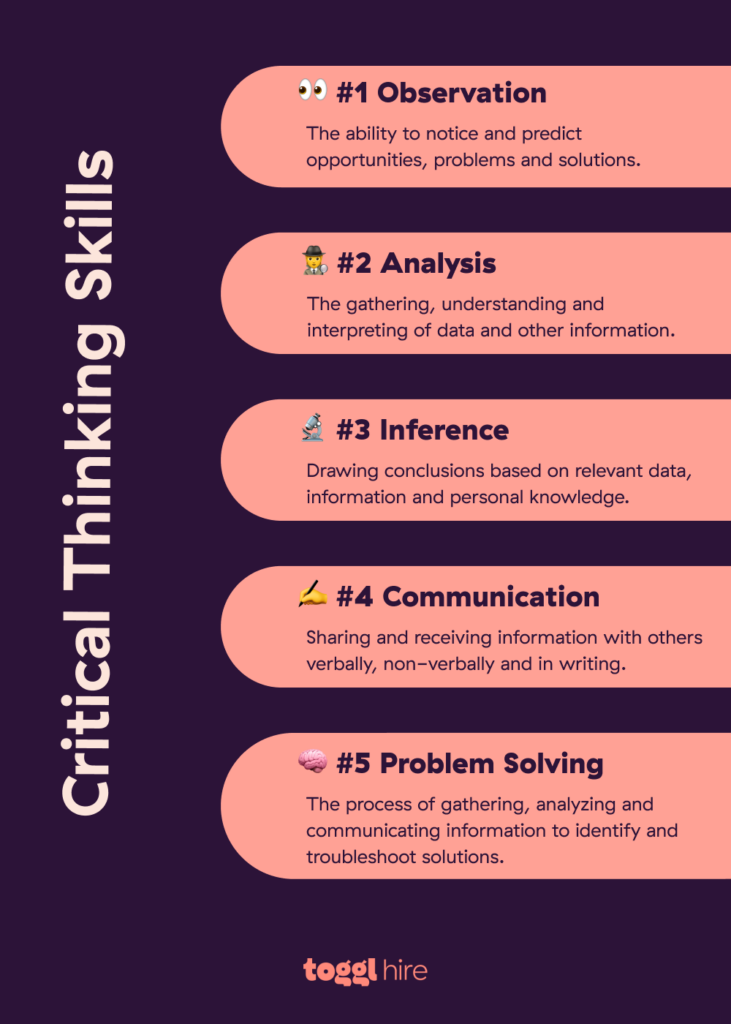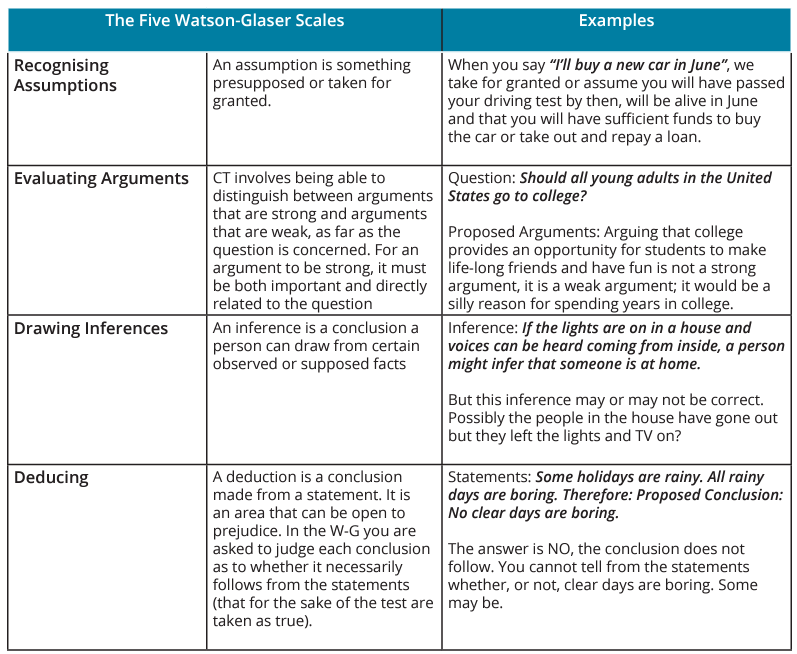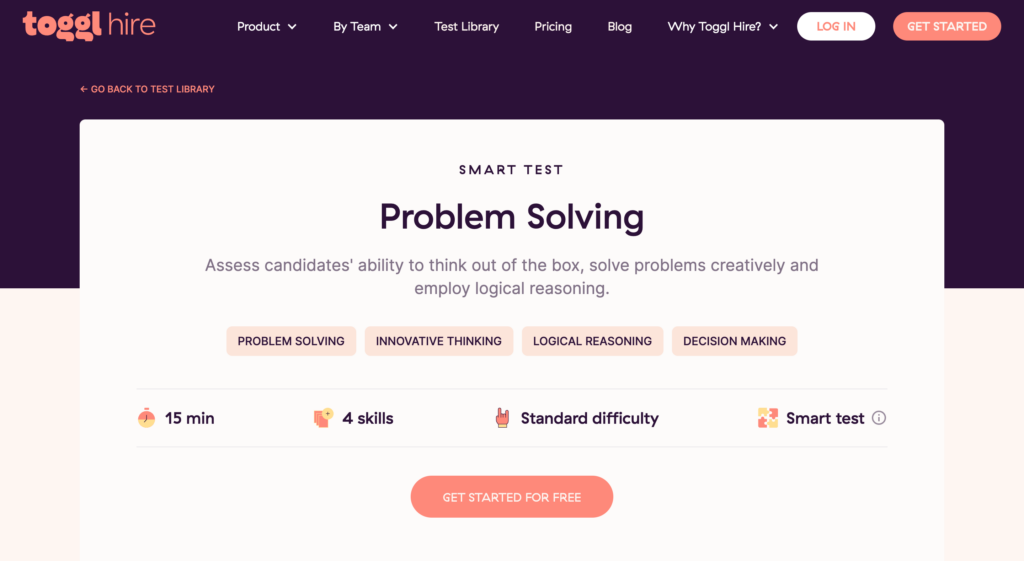In the current age of information overload, critical thinking (CT) is a vital skill to sift fact from fiction. Fake news, scams, and disinformation can have a negative impact on individuals as well as businesses. Ultimately, those with finer CT skills can help to lead their team with logical thinking, evidence-based motivation, and smarter decisions.
Today, most roles require critical thinking skills. And understanding how to test and evaluate critical thinking skills can not only help to differentiate candidates but may even predict job performance.
This article will cover:
- What is critical thinking?
- Critical thinking vs problem-solving
- 5 critical thinking sub-skills
- The importance of assessing critical thinking skills
- 4 ways to leverage critical thinking assessments
What is critical thinking?
Critical thinking is the process of analyzing and evaluating information in a logical way. And though a valuable skill since as far back as the early philosophers’ era, it is just as vital today. For candidates to succeed in the digital economy, they need modern thinking skills that help them think critically.
Whether we realize it or not, we process tons of data and information on a daily basis. Everything from social media to online news, data from apps like Strava – and that’s on top of all the key metrics in relation to our professional role.
Without a shadow of a doubt, correctly interpreting information — and recognizing disinformation — is an essential skill in today’s workplace and everyday life. And that’s also why teaching critical thinking skills in education is so important to prepare the next generation for the challenges they will face in the modern workplace.
Critical thinking isn’t about being constantly negative or critical of everything. It’s about objectivity and having an open, inquisitive mind. To think critically is to analyze issues based on hard evidence (as opposed to personal opinions, biases, etc.) in order to build a thorough understanding of what’s really going on. And from this place of thorough understanding, you can make better decisions and solve problems more effectively.
Bernard Marr | Source
Today, candidates with CT skills think and reason independently, question data, and use their findings to contribute actively to their team rather than passively taking in or accepting information as fact.
Why are critical thinking skills important?
In the workplace, those with strong CT skills no longer rely on their gut or instinct for their decisions. They’re able to problem-solve more effectively by analyzing situations systematically.
With these skills, they think objectively about information and other points of view and look for evidence to support their findings rather than simply accepting opinions or conclusions as facts.
When employees can turn critical thinking into a habit, it ultimately reduces personal bias and helps them be more open to their teammates’ suggestions — improving how teams collaborate and collectively solve problems.
Critical thinking vs. Problem solving – what’s the difference?
Let’s explore the difference between these two similar concepts in more detail.
Critical thinking is about processing and analyzing information to reach an objective, evidence-based conclusion. Let’s take a look at an example of critical thinking in action:
- A member of the team suggests using a new app they’ve heard about to automate and speed up candidate screening. Some like the idea, but others in the team share reasons why they don’t support the idea. So you visit the software website and look at the key features and benefits yourself, then you might look for reviews about it and ask your HR counterparts what they think of it.
The reviews look promising, and a few of your fellow practitioners say it’s worked well for them. Next, you look into the costs compared to the solution your team is already using and calculate that the return on investment (ROI) is good. You arrive at the conclusion that it’d be worth testing the platform with the free trial version and recommend this to your team.
On the other hand, problem solving can involve many of the same skills as critical thinking, such as observing and evaluating. Still, it focuses on identifying business obstacles and coming up with solutions. So, let’s return to the example of the candidate screening software and see how it might work differently in the context of problem-solving:
- For weeks, the talent acquisition team has complained about how long it takes to screen candidates manually. One of the team members decides to look for a solution to their problem. They assess the team’s current processes and resources and how to best solve the issues.
In their research, they discover the new candidate screening platform and test out its functionality for a few days. They feel it would benefit the team and suggest it at the next meeting. Great problem solving, HR leader!
What are the 5 sub-skills that make up critical thinking?

Now that we’ve established what CT is, let’s break it down into the 5 core sub-skills that make up a critical thinking mindset.
- Observation: Being observant of your environment is the first step to thinking critically. Observant employees can even identify a potential problem before it becomes a problem.
- Analysis: Once you’ve observed the issue or problem, you can begin to analyze its parts. It’s about asking questions, researching, and evaluating the findings objectively. This is an essential skill, especially for someone in a management role.
- Inference: Also known as construct validity, is about drawing a conclusion from limited information. To do this effectively may require in-depth knowledge of a field. Candidates with this skill can contribute a lot of value to a startup, for instance, where initially, there may be little data available for information processing.
- Communication: This pertains to expressing ideas and your reasoning clearly and persuasively, as well as actively listening to colleagues’ suggestions or viewpoints. When all members of a team or department can communicate and consider different perspectives, it helps tasks (and, well, everything) move along swiftly and smoothly.
- Problem solving: Once you begin implementing a chosen solution, you may still encounter teething problems. At that point, problem solving skills will help you decide on the best solution and how to overcome the obstacles to bring you closer to your goal.
What is a critical thinking assessment test?
Though there are a few different ways to assess critical thinking, such as the Collegiate Learning Assessment, one of the most well-known tests is the Watson Glaser™ Critical Thinking Appraisal.
Critical thinking tests, or critical reasoning tests, are psychometric tests used in recruitment at all levels, graduate, professional and managerial, but predominantly in the legal sector. However, it is not uncommon to find companies in other sectors using critical thinking tests as part of their selection process. This is an intense test, focusing primarily on your analytical, or critical thinking, skills.
Source
These tests are usually timed and typically include multiple choice items, short answers or short scenario-based questions to assess students or prospective candidates. They test candidates’ ability to interpret data without bias, find logical links between information, and separate facts from false data.


But how do these tests measure critical thinking?
In addition to educational and psychological testing, many employers today use critical thinking tests to assess a person’s ability to question information — to ask What, Why, and How of the data. A standard critical thinking test breaks down this aptitude by examining the following 5 components:
- assumption – analyzing a scenario to determine if there are any assumptions made
- deduction – the ability to choose which deductions are logical
- evaluating evidence – in support of and against something
- inference – conclusions, drawn from observed facts
- interpretation – interpreting the accuracy of a stated conclusion (based on a scenario)
Why is it important to assess critical thinking skills during the recruitment process?
Critical thinking skills may be considered a soft skill, but it’s become a prerequisite in certain industries, like software, and for many roles. Marketing managers, project managers, accountants, and healthcare professionals, for example, all require a degree of CT skills to perform their roles.
The kinds of businesses that require critical thinking include technology, engineering, healthcare, the legal sector, scientific research, and education. These industries are typically very technical and rely on data. People working in these fields research and use data to draw logical conclusions that help them work smarter and more efficiently.
In the hiring process, test takers with good critical thinking skills stand out. Why? Because they are able to demonstrate their ability to collaborate, problem-solve, and manage pressure in a rational, logical manner. As a result, they’re more likely to make the right business decisions that boost efficiency and, ultimately, a business’s bottom line.

Examples of jobs that rely on critical thinking skills
Critical thinking is not rocket science, but it is an important skill when making decisions — especially when the correct answer is not obvious. Here are a few examples of job roles that rely on critical thinking dispositions:
- computer programmers or developers: may use critical thinking and other advanced skills in a variety of ways, from debugging code to analyzing the problem, finding potential causes, and coming up with suitable solutions. They also use CT when there is no clear roadmap to rely on, such as when building a new app or feature.
- criminologists: must have critical thinking abilities to observe criminal behavior objectively and to analyze the problem in such a way that they can be confident in the conclusions they present to the authorities.
- medical professionals: need to diagnose their patients’ condition through observation, communication, analysis and solving complex problems to decide on the best treatment.
- air traffic controllers: need a super clear, calm head to deal with their high-stress job. They observe traffic, communicate with pilots, and constantly problem-solve to avoid airplane collisions.
- legal professionals: use logic and reasoning to analyze various cases – even before deciding whether they’ll take on a case – and then use their excellent communication skills to sway people over to their reasoning in a trial setting.
- project managers: have to deal with a lot of moving parts at the same time. To successfully keep projects on time and budget, they continually observe and analyze the progress of project components, communicate continually with the team and external stakeholders and work to solve any problems that crop up.
What are the risks of not testing for critical thinking?
By not evaluating critical thinking beforehand, you may end up hiring candidates with poor CT skills. Especially when hiring business leaders and for key positions, this has the potential to wreak havoc on a business. Their inaccurate assumptions are more likely to lead to bad decisions, which could cost the company money.
Weak critical thinking can result in a number of issues for your organization and justifies the expense or added effort of asking your candidate to complete critical thinking tests in the hiring process. For example, poor CT skills may result in:
- making mistakes
- not being able to take action when needed
- working off false assumptions
- unnecessary strain on work relationships
4 ways to assess critical thinking skills in candidates
Now that we’ve seen how important it is for most candidates today to have strong critical thinking skills, let’s take a look at some of the assessment instruments the talent acquisition team can use.
#1 – A homework assignment
A homework assignment is a task that assesses whether test takers have the right skills for a role. If critical thinking is essential for a particular job, you could provide candidates with a homework assignment that specifically tests their ability to:
- accurately interpret relevant evidence
- reach logical conclusions
- judge information skeptically
- communicate their own viewpoint and others’ backed by facts
Tip: use Toggl Hire’s skills screening tests to easily filter out the good candidates first and speed up your hiring process.
#2 – Behavioral and situational interview questions
Ask the candidate to provide examples of situations when they used CT for solving problems or making a decision. This can provide insight into the candidate’s ability to analyze information and make informed decisions. For example:
Critical thinking example questions:
- Tell me about a time when you had to make a really difficult decision at work.
- What would you do in a situation where your manager made a mistake in a presentation or report?
- How would you respond if a colleague shared a new idea or solution with you?
- How do you evaluate the potential outcomes of different actions or decisions?
- Can you describe a situation where you had to think on your feet and come up with a creative solution to a problem?
- How do you ensure that your decision-making is based on relevant and accurate information?
#3 – Discuss the candidate’s critical thinking skills with their references
Additionally, the hiring manager can ask the candidate’s references about how the candidate demonstrated CT skills in the past.
- Can you recall a time when (the candidate) had to convince you to choose an alternative solution to a problem?
- Tell me about a time when (the candidate) had to solve a team disagreement regarding a project.
#4 – Critical thinking tests
Ask the candidate to complete a critical thinking test and score against critical thinking rubrics. You can then share feedback on their test scores with them and explore their willingness to improve their score, if necessary. Or compare their score to other applicants, and prioritize those with higher scores if the role truly requires a critical thinker.
Create your next critical thinking assessment with Toggl Hire
Assessing critical thinking skills is becoming a key component in the hiring process, especially for roles that require a particularly advanced skillset. Critical thinking is a sign of future performance. Candidates that clearly demonstrate these skills have a lot to offer companies, from better decision-making to more productive relationships and cost savings.
If your team needs help automating the screening process, and creating custom skills tests based on specific roles, try Toggl Hire’s skills test questions engine or the Custom Test Builder to create the exact questions you want from scratch.
Juste loves investigating through writing. A copywriter by trade, she spent the last ten years in startups, telling stories and building marketing teams.





